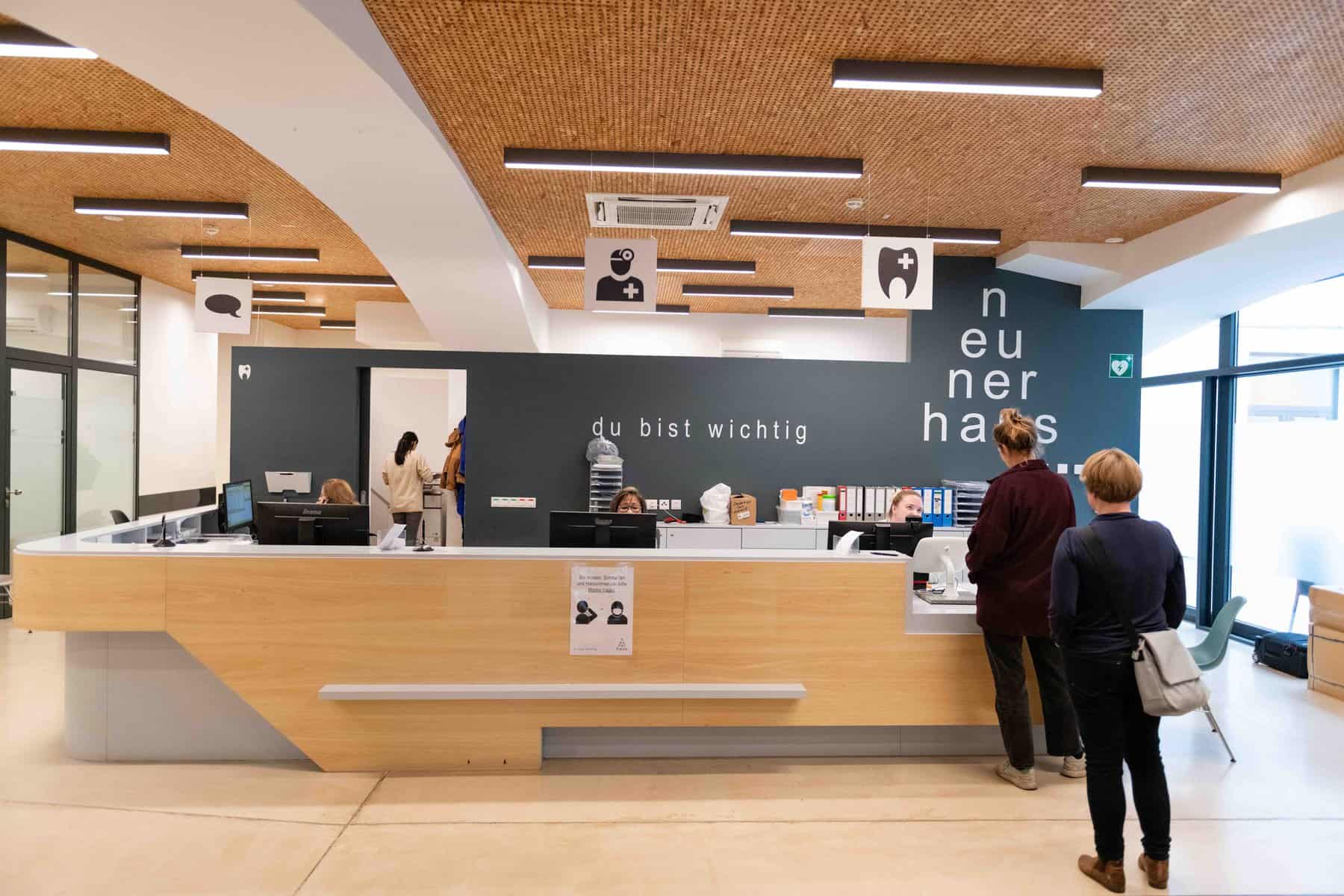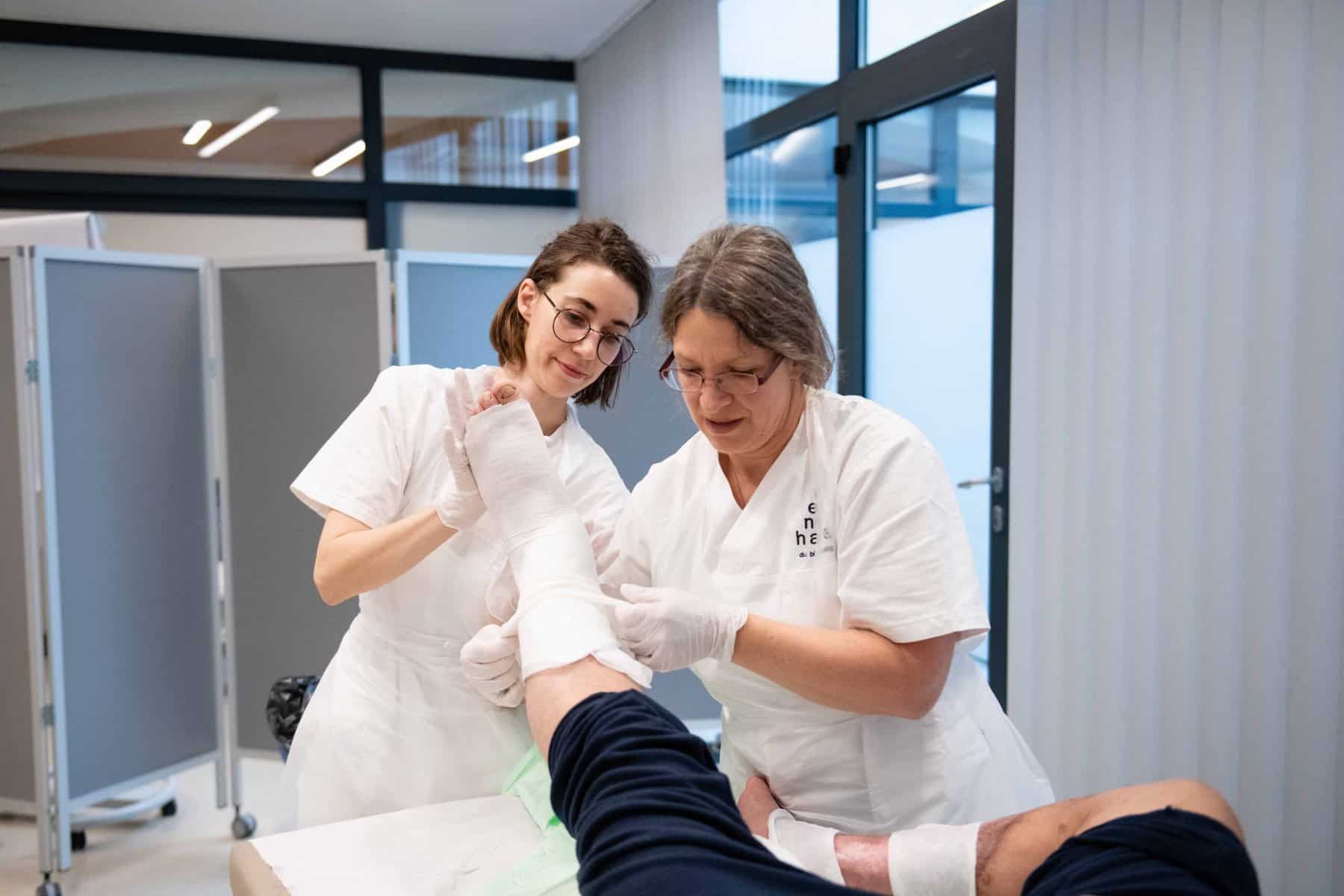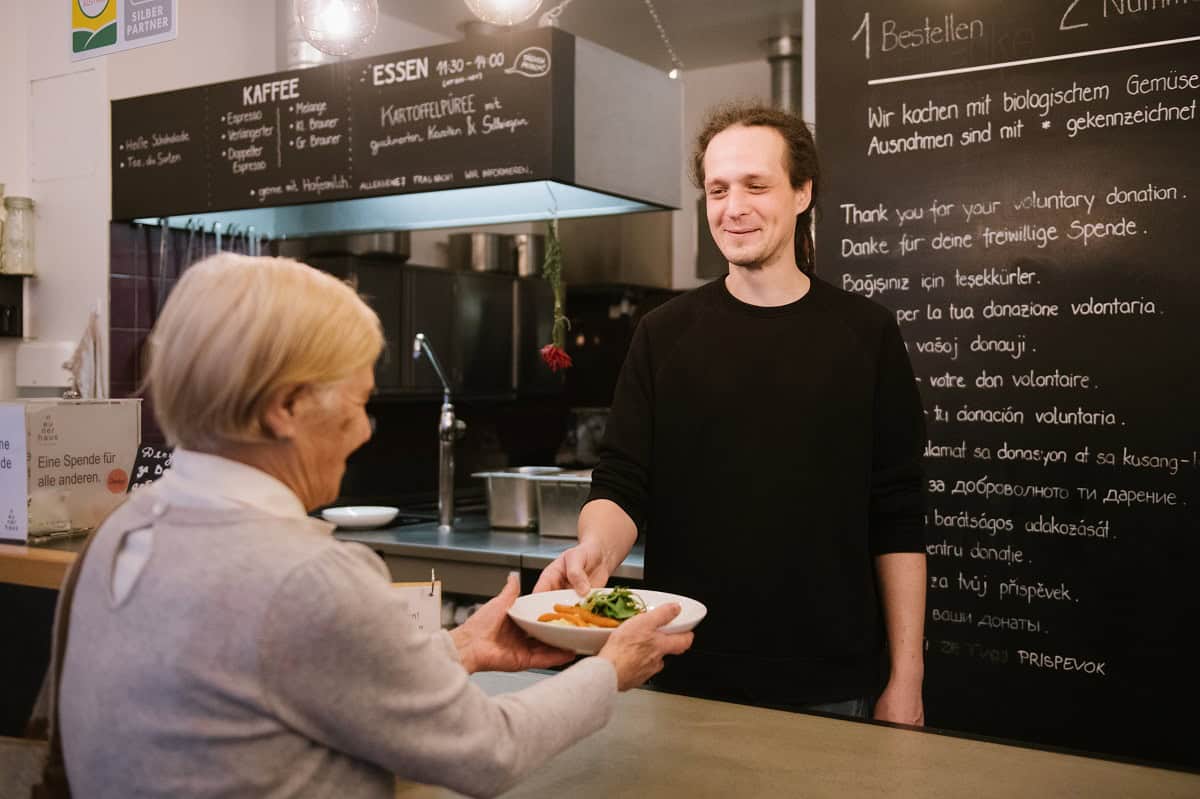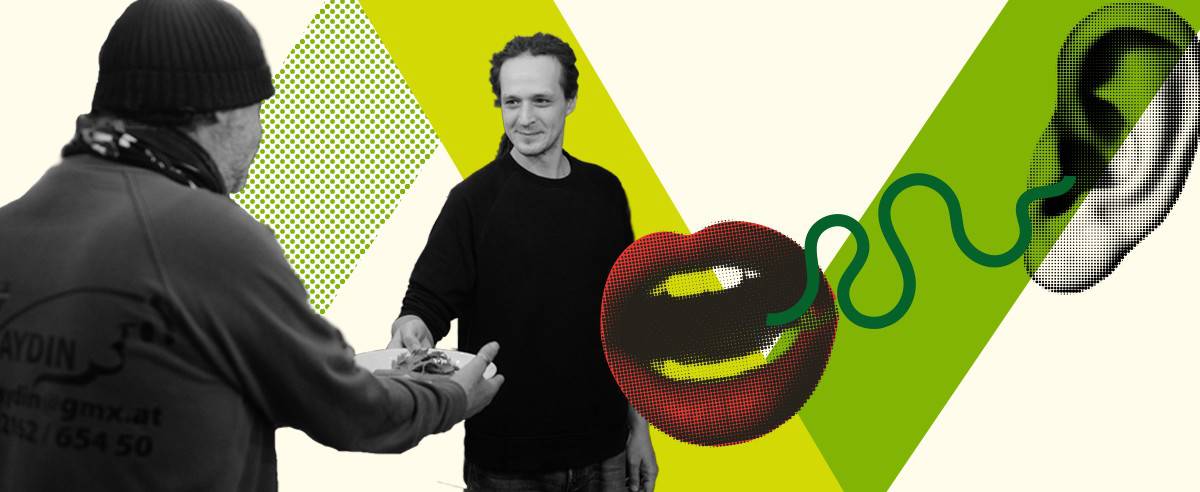Neunerhaus, an Austrian social organisation, throws a lifeline, not just a helping hand, to those facing homelessness. In this article, Elisabeth Hammer, neunerhaus' Managing Director, sheds light on the complexities of homelessness and shares how this organisation is providing essential support, healthcare, and advocating fiercely for social inclusion. It's not just physical health that suffers when you face homelessness; your mental wellbeing takes a devastating hit too. By investing in affordability, expanding support services, and prioritising mental health, we can rewrite the narrative of homelessness for a more inclusive society for all.
It's a cold spring night and I'm travelling on the metro into central Brussels. As the train pulls into one of the metro stations, a woman steps aboard. Delicately dressed in an oversized denim jacket and accompanied by a small dog, she tightly grasps a bruised paper cup, looking for nothing more than a smile and some loose change.
As she approaches the two women sitting opposite me, they flinch and look at her with contempt, not even breaking a smile. Sadly, this judgement, is the reality for many who are living in precarious conditions.
There's a famous proverb from my homeland of Wales: we all enter this world the same way and leave the same way—meaning that despite the diverse paths we walk, we all share a common humanity and vulnerability. Compassion comes for free in this life and it's a basic currency available to us all. So where is this humanity and compassion when it comes to having empathy towards those faced with living in harsh conditions? This lack of empathy is exactly what organisations such as neunerhaus are working to change.
Combatting homelessness with compassion and support
Vienna's social organisation, neunerhaus, works tirelessly to champion the dignity and wellbeing of this marginalised community, often pushed to the margins of society with limited social, political, and economic power. Neunerhaus advocates for compassion and social inclusion, empowering those at risk of poverty to build self-sufficient lives. They provide essential support, including medical care, housing, and advice, to help people achieve lasting improvements in their living situation. Their ultimate goal? To break the cycle of homelessness and create sustainable solutions for a future filled with dignity and independence.
"Our users encounter many different kinds of prejudices. In addition to our daily work, we at neunerhaus also want to emphasise to the outside world that there is not just 'THIS ONE image of the homeless', but that homelessness can affect anyone, and more quickly than you might think—especially in these harsh economic times. In our day-to-day work, we often hear, 'I never thought it would happen to me.' That's why we let those affected speak for themselves and focus our campaigning and public relations work on making a real difference in people's minds and hearts," explains Elisabeth Hammer, a social scientist, and Managing Director at neunerhaus and Chairwoman of the Federal Working Group on Homeless Assistance (Bundesarbeitsgemeinschaft Wohnungslosenhilfe (BAWO).
Causes and consequences
"I never thought it would happen to me." This phrase is a stark reminder of the fragility of life and how quickly circumstances can change for anyone.
Homelessness is a complex issue. It has many causes and far-reaching consequences. In Austria, just like many other countries across Europe, people experiencing homelessness is increasing, and its reasons are as diverse as the people affected, ranging from personal crisis such as separation, illness and job loss. However, it's not just personal crisis that are leading to an increase in homelessness. The cost-of-living crisis and the war in Ukraine amongst other factors have put many into turmoil.
These are unprecedented times of crisis that can push people into desperate situations. The latest data from FEANTSA—the European Federation of National Organisations Working with the Homeless—suggests that 895,000 people are currently homeless in the European Union (EU). To put this bluntly, this figure equates to a population comparable to that of Marseille or Turin sleeping on the streets every night. In Austria alone, more than 20,000 people are registered as homeless.
"Current crises are exacerbating the situation and affecting societal groups for whom the possibility of losing their home was never thought possible. Price increases, inflation, rising energy and housing costs and structural exclusions on the housing market are leading to an increase in the number of people affected", Elisabeth explains.
Poverty makes you sick, illness makes you poor
So, what affect does this have on someone's health and wellbeing? The correlation between poverty and poor health is undeniable, not just affecting people's physical health but also mental wellbeing. Neunerhaus's powerful motto: 'Poverty makes you sick, illness makes you poor', reinforces the sad reality of this fact.
Socioeconomic determinants factors such as having a stable job, safe housing, and access to healthy food are major influences on our health. These social determinants of health can impact up to 55% of health outcomes. Addressing these factors can improve overall health and reduce longstanding inequalities. To achieve this, it requires a collaborative effort from all sectors, including government agencies and civil society organisations.
To address the links between poverty, health outcomes and mortality, neunerhaus set up an inclusive healthcare system and established a Mobile Doctors service, set up nearly 20 years ago. This service provides tailored healthcare to homeless and uninsured individuals. These services have been combined into the neunerhaus Health Centre, which offers a range of nursing, medical, dental, and mental health services. Committed to ensuring access to healthcare for marginalised populations, neunerhaus also provides essential social and peer support through the neunerhaus Café and veterinary care centre, fostering trust and community engagement.
"[Both the café and veterinary care centre] are essential services that ensure social participation and contribute to people's health by counteracting isolation and exclusion. The neunerhaus Café offers an affordable, warm and healthy meal, while the volunteer vets at the neunerhaus Veterinary Care Centre look after the often last (animal) companions of homeless and homeless people free of charge. These services often build initial trust, strengthen relationships and pave the way to receiving care through a health centre," explains Elisabeth.
"I try to eat healthy, as vegetarian as possible. I cook a lot at home, but when the money runs out from the middle or the end of the month, I come to the neunerhaus café", says Jenny S., a 28-year-old who has not had a permanent residence for many years, and is in therapy due to a mental illness, but has plans to do violence prevention work in schools.


Overcoming barriers to support mental health and wellbeing
Yet despite these efforts, accessing support services remains a challenge for many facing homelessness. Barriers such as administrative hurdles, lack of health insurance, and stigma surrounding those living in harsh conditions often deter individuals from seeking help. neunerhaus confronts these barriers by offering guidance, support, and translation services, ensuring that marginalised individuals can access the care and support that they need.
"At neunerhaus, we have always combined health and social issues. Our experience shows that precarious living conditions make people ill - both physically and mentally. In addition to their own four walls, users also need psychosocial support. This is provided by neunerhaus Housing First and Mobile Assisted Living with an interdisciplinary support team that includes social workers and peer counsellors as well as mental health specialists," states Elisabeth.
The COVID-19 pandemic shone a light on the cracks in our health systems and the urgency of addressing mental health within the homeless community. In response, neunerhaus expanded its services and introduced new initiatives such as the Mental Health Practice (Praxis Psychische Gesundheit) and the neunerhaus health advice and support line in cooperation with the City of Vienna to improve the mental wellbeing of those impacted by homelessness. In 2023, over 1,500 medical phone consultations took place, with a third of calls coming from hospitals, pharmacies and doctors.
"We have noticed an increasing demand for social work counselling, which goes hand in hand with medical care at the neunerhaus Health Centre. While there were over 1,500 counselling sessions in 2019, there were already two thirds more in 2020 with 2,500 consultations. There was an increased need for counselling, exchange, relief and referral. The complexity of individual cases also increased. As a result, the topic of mental health has been a strong focus and challenge for us during the pandemic", states Elisabeth.
Lived experiences also provide a unique and invaluable form of support that can be transformative not only for individuals, but also for communities and societies. This is nothing more important than when it comes to supporting the mental health of those facing homelessness. "Our peer employees help to break down prejudices and create a supportive environment to talk about problems and ask for help. Homeless peers have experienced homelessness themselves. After training at the neunerhaus Peer Campus, they themselves work as peer employees in homelessness services. There, they use their reflected knowledge and experience to help other homeless people," Elisabeth continues.
Monika M. lives in a facility run by the Vienna Homeless Help Center and earlier this year completed her peer employee training explaining: "I remember a client who regularly came in from the streets; she always sat in the same corner. Just ate and slept. And I just sat down next to her and asked her how she was doing. She really came out of herself. For the first time she had a glow on her face. That was the best feeling for me. There really is nothing nicer."
Misconceptions
Homelessness isn't defined by a single image. Anyone can fall on hard times. Organisations such as neunerhaus fight this misconception by amplifying the voices of those experiencing homelessness, fostering empathy not just in the public, but also within health and social systems.
Many homeless and uninsured people face stigma, shame and prejudice when seeking medical and health care. "A patient once told us that her e-card was touched with a handkerchief by the doctor's assistant," says Elisabeth. Neunerhaus is there to flip this script offering an inviting health centre, sending the message, 'you matter.'"
"Our neunerhaus Health Centre also breaks down any preconceptions and demonstrates our basic attitude of 'you are important.' Large, beautiful, bright, new rooms that, just like the people who work in them, are friendly and welcoming. What's the first impression many patients get when they walk in? 'Wow, this looks like a 'normal' health centre.' Yes, of course, that's what it's supposed to be!" she continues.
The effects of homelessness are disproportionately felt by certain demographic groups, such as women. Their needs are often overlooked as they are hidden due to fear or domestic violence. Addressing the specific needs of these marginalised groups is crucial in combatting homelessness effectively.
Elisabeth highlights: "Around a third of homeless and homeless people are women, they are often invisible, on the one hand because they remain in so-called 'hidden homelessness', accepting violent relationships because it provides them with a place to live; on the other hand because they are less noticeable - also in everyday life and in the street scene - and try to conceal their precarious situation as well and as long as possible".

Europe's housing crisis: what's the impact on wellbeing?
Across Europe, the housing crisis is leaving many grappling with soaring rental, mortgage and energy costs. Low-income households are particularly vulnerable, spending nearly half of their disposable income just to keep a roof over their heads. This lack of affordable housing isn't just a marginal issue anymore- it's pushing more people into homelessness and vulnerable housing situations. The problem is rooted in a decade of rising house prices (up 37% in the EU between 2010 and 2021), which has also driven up rents by 16%. While the average EU resident spends 19% of their income on housing. low-income earners are hit much harder, with that figure jumping to almost 38%. This makes an already difficult situation, much worse for those already struggling financially and housing costs become an even bigger burden.
Organisations such as neunerhaus emphasise the need for effective housing policies, such as strengthening the rental market, reducing housing costs, and ensuring inclusive access to housing. Vienna's social housing model, which combines a high percentage of social housing, a strong social network, and a high-standard of living to reduce homelessness, is an effective illustration of the impact of targeted policies.
Housing First: cross collaboration is key
"With the right conditions, ending homelessness in Vienna is achievable", says Elisabeth. In Europe, Austria is a leader in ending homelessness through its commitment to raise the issue at both federal and city levels. However, the challenge of securing and creating affordable housing remains. Earlier this year, Austria's Minister of Social Affairs, Johannes Rauch, explored the potential of preventive housing programmes like Housing First to end homelessness entirely.
The introduction of the Housing First initiative in Austria has been instrumental in providing housing and support services to the homeless population. By prioritising stable housing as a first step, Housing First has shown promising results in ending homelessness. However, ongoing efforts are needed to address limitations and expand such initiatives.
Since 2012, 585 people have found a new home thanks to neunerhaus through its collaboration with Housing First, including 253 children, with 93% of tenants still living in their Housing First flat three years on. This alone exemplifies the effectiveness of the concept.
Organisations and initiatives such as neunerhaus, Housing First Austria and BAWO work together through multidisciplinary approaches. These collaborations, offering integrated services and mental health support, are crucial in stabilising individuals and helping them find lasting solutions.
"Housing First is now regarded as the benchmark for ending homelessness in Europe and is the mainstream model for homelessness assistance in Vienna," explains Elisabeth. "Housing First Austria, in collaboration with other stakeholders such as BAWO (in which neunerhaus is involved), social services, and housing groups, is actively helping to rehome over 1,000 people in Austria into affordable housing by autumn 2024. Funded by the federal government, this initiative showcases the power of collaboration in tackling homelessness", she continues.
Economic factors, such as unemployment and housing affordability, play a significant role in driving homelessness. High housing costs coupled with low wages exacerbate the problem, highlighting the complex interplay between economic conditions and precarious housing. "Broadly speaking, effective housing policy measures are needed to make housing sustainable, affordable and inclusive. The legal framework for sustainable housing must be strengthened, non-discriminatory and inclusive access must be ensured and more affordable housing must be created. In addition, structural measures to combat poverty are necessary in order to end homelessness in both the housing and social sectors," continues Elisabeth.
How can we overcome homelessness in Europe?
Looking ahead, policymakers must prioritise affordable housing and social inclusion to prevent and address homelessness effectively. By expanding target-specific care and removing access barriers, we can work towards ending homelessness and creating a more equitable society for all. With collaborative efforts and sustained commitment, we can make strides towards a future where homelessness is a factor of the past and not of the future.
"Housing - above all affordable housing - should be at the top of the national and international agenda. After all, you only have a chance of social participation, health, and a sustainably stable life if you have your own home," explains Elisabeth.
"Our goal is to make housing affordable, sustainable and inclusive. This must be possible in the welfare state of Austria, in the human rights city of Vienna. Vienna's housing policy infrastructure is excellent by international standards: a high proportion of social housing, a well-developed social network, and a high quality of life," she continues.
To build a future free from homelessness requires a multisectoral approach that addresses the root causes of homelessness and provides support to those who are experiencing it. This includes increasing the availability of affordable housing, removing barriers to accessing housing and social services, expanding healthcare and other support services for vulnerable populations, and strengthening collaboration between different sectors.

Ruth Thomas
Ruth joined the EuroHealthNet team in April 2022 as Communications Officer.
She holds a BA Hons degree in Print Journalism from the University of Gloucestershire (UK) and has worked in the not-for-profit sector for over ten years. Ruth has applied her communication skills to a number of positions including for an energy trade association in Brussels and as part of a National Research Network (Sêr Cymru / Stars Wales), where she was based at a UK university.
